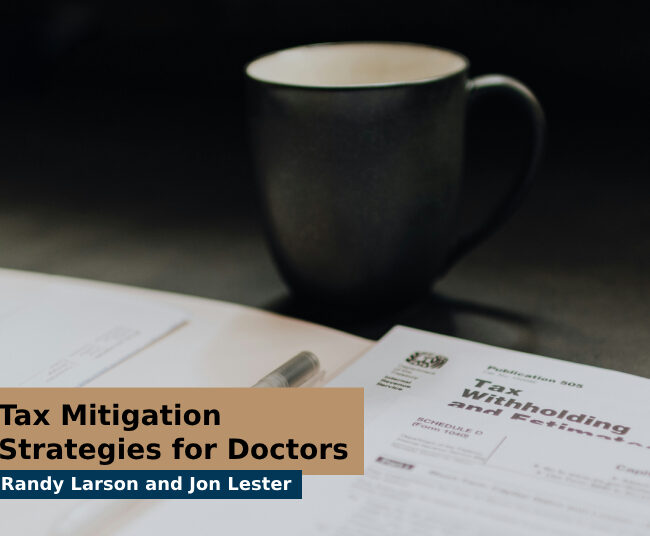The Top 3 Estate Planning Mistakes Doctors Make

Physicians are faced with challenges that require a different perspective on estate planning—there are no two ways around it. Sometimes just thinking about the estate planning process can be daunting enough—let’s not even talk implementation and keeping up with updates life or asset changes call for. With the right professional, the estate planning process doesn’t have to be that way. Here is a list of the top three estate planning mistakes we see doctors make…
1. NOT HAVING A PLAN!
The first of the top estate planning mistakes is the single greatest issue we see with a physician client’s overall life and financial planning – not having a plan. It is not that they think it is not important. It is simply that they have not gotten around to it or they don’t know where to start. As if residency, fellowship and early years in practice are not grueling enough, there are many questions that stall the process before it begins: “What do I even need to have in place?,” “How much will it cost?,” “How long will the entire process take?,” “Do I need an attorney or can I do it on my own?” and “Who will take our kids if we both die?”
If you fall in this category, here are some questions to ask yourself: How do you feel about your state court deciding who will be the guardian of your minor children in the event of your premature death? Are you comfortable with your children receiving millions (from life insurance) at age 18 years old? How do you feel about your spouse remarrying and the new spouse having access to and discretion over your current marital assets? Experienced estate planning attorneys can help navigate these questions and more so there is clear direction when the time comes.
2. THE OUTDATED AND/OR “UNFUNDED” ESTATE PLAN
A few years ago, I sat down with a 53 year old anesthesiologist with 3 children between the ages of 14 and 19. When I asked him if he had an estate plan, he very proudly replied, “Yes!” I said, “That’s great!” and probed a little further. It turned out that the very basic plan was 10 years old and hadn’t been looked at since. Many of the terms and strategies in the plan no longer even accomplished his tax and family objectives.
More importantly, after looking over his 20+ investment accounts, I asked him how it had been going keeping up with re-titling all of his accounts into his revocable trust over the last 10 years. He asked, “Re-what?” I soon discovered that he had never funded his trust (put his assets in the name of the trust). He was surprised to hear that his revocable trust was virtually useless to avoid probate and legal complications after death as it would only apply to assets owned by the trust—currently nothing.
Your estate plan needs ongoing attention no different than other assets like your car or investment portfolio. Cars need tune-ups, tire re-alignments and oil changes and investment portfolios need to be consistently rebalanced to remain diversified. Likewise, with tax, family and net worth changes, your estate plan needs to be continually funded and updated. If it has been 3 years since you have looked at your estate plan, it would be a good idea to have it reviewed.
3. THE “ONE-SIZE-FITS-ALL” PLAN
For this small percentage of doctors who have properly executed their plan, there is still another hurdle. The plan is usually generic. For example, the assets are often distributed to the children 1/3 at 21, 1/3 at 25 and 1/3 at 30 (or something like that).
To illustrate how this one of the top estate planning mistakes, I recently met with a doctor couple in San Francisco, CA with this distribution pattern. They would have an 8 million dollar (with life insurance) estate if they died today. Fortunately, they had just met with an attorney to draft their estate plan with the intent to take care of their 2 minor children. Unfortunately, the plan will likely do more harm than good to their children. I asked them how they felt about the possibility of their son getting over 1.5 million dollars automatically on his 21st birthday. It did not take long for them to consider the effects on their son (no matter how good of a young man he turns out to be) that a seven-figure automatic distribution could have. This, among other deficiencies in their generic plan, caused them to seek out a more tailored strategy that flowed from a more thoughtful and customized approach to estate planning.
Doctors are not like the rest of the country. Higher incomes necessitate larger death benefits in the early years and higher net worth in later years. Either way, more money, more problems. A plan that might work for the rest of the country could actually do more harm to the physician family.
Fore more, read this Forbes article on Avoiding 7 Deadly Top Estate Planning Mistakes
Randy is a trusted resource for doctors and high-net-worth individuals and families, offering comprehensive financial planning as well as rare private equity opportunities for his clients. Randy earned his J.D. and LL.M. in Taxation from Washington University in St. Louis. Randy is a Certified Financial Planner® as well as a Missouri-licensed attorney. In addition to co-founding 25, he founded The Larson Law Firm, LLC, practicing in the areas of estate planning, business law, and asset protection for physicians and dentists.





